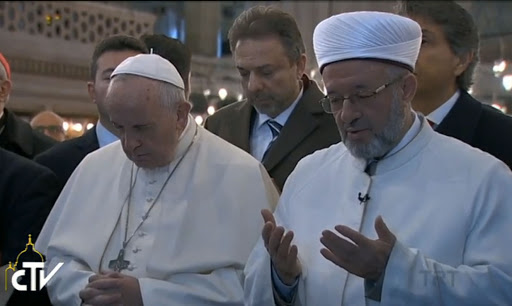Pope Francis and Ecumencial Patriarch Bartholomew will sign a joint declaration Sunday, confirming the growing relationship between the long-separated Churches of Rome and Constantinople.
The Pope’s visit comes just six months after he and Bartholomew met in Jerusalem and singed a Joint Declaration about their commitment to the search for Christian unity.
Accompanying Pope Francis on the journey to Turkey is the head of the Pontifical Council for Promoting Christian Unity, Cardinal Kurt Koch, who said in a Vatican Radio interview this week that first of all ithe papal visit will be another step in deepening the good relations that already exist between Rome and Constantinople.
He also pointed out that since Pope Paul VI went to Constantinople in 1967, every Pope had made a visit in the second year of his pontificate: Pope St. John Paul II, Benedict XVI. The Swiss cardinal speaks of a long tradition of mutual visits: “The Catholic Church visits Constantinople on the Feast of St. Andrew on November 30, and a high delegation comes to Rome to celebrate the Feast of SS. Peter and Paul on June 29.
Cardinal Koch agrees that the strong personal friendship between the Pope and the Patriarch can help strengthen this engagement because, he says, the Ecumenical Patriarch is a very good help for him. “There are some tendencies in the International Commission [for Catholic-Orthodox dialogue] that say we must leave the ecumenical theological dialogue and have a good collaboration in other issues. But the Patriarch says we have the duty to deepen the theological questions, and that is also my opinion and commitment and I am very grateful for the help of the Ecumenical Patriarch.”
Asked whether the Pope’s presence in Istanbul can help the Orthodox Church with its demands, for example, for legal recognition or for the reopening of the Orthodox Seminary of Halki for training new priests, Koch says that his hope is that after “this long time that the theological school of Halki has been closed, the new government may have a new opportunity to open it.”
He says he has heard from government sourches that they will be able to do so when there is a change in Athens, because there is no mosque in the Greek capital. But, he points out: “this is a little strange because the Ecumenical Patriarch has no responsibility in Athens.”
“We must resolve the problem in Greece and we must resolve the problem in Turkey. And hopefully the visit of the Holy Father can help resolve relationships between the Church and the government,” he says.
The journey will also provide a strong focus on Catholic-Muslim relations and on the Syrian and Iraqi refugee crisis on the country’s border. Cardinal Koch says the pressing situations in the Middle East, including the persecution of Christians and other minorities, will clearly be a main issue in the conversation as both the Patriarch and the Pope are very engaged in these problems and they can raise a common voice against these situations.

